
Yugoslavia was a country in Southeast and Central Europe that existed from 1918 to 1992.

Jasenovac was a concentration and extermination camp established in the village of the same name by the authorities of the Independent State of Croatia (NDH) in occupied Yugoslavia during World War II. The concentration camp, one of the ten largest in Europe, was established and operated by the governing Ustaše regime, Europe's only Nazi collaborationist regime that operated its own extermination camps, for Serbs, Romani, Jews, and political dissidents. It quickly grew into the third largest concentration camp in Europe.

Vojvodina, officially the Autonomous Province of Vojvodina, is an autonomous province that occupies the northernmost part of Serbia, located in Central Europe. It lies within the Pannonian Basin, bordered to the south by the national capital Belgrade and the Sava and Danube Rivers. The administrative centre, Novi Sad, is the second-largest city in Serbia.
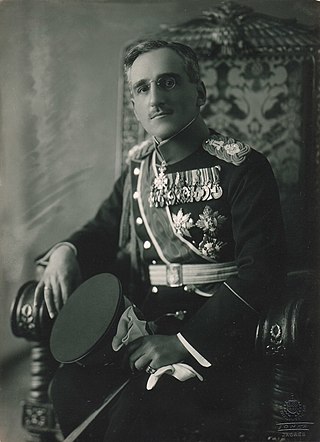
Alexander I, also known as Alexander the Unifier, was King of the Serbs, Croats and Slovenes from 16 August 1921 to 3 October 1929 and King of Yugoslavia from 3 October 1929 until his assassination in 1934. His reign of 13 years is the longest of the three monarchs of the Kingdom of Yugoslavia.

Zachlumia or Zachumlia, also Hum, was a medieval principality located in the modern-day regions of Herzegovina and southern Dalmatia. In some periods it was a fully independent or semi-independent South Slavic principality. It maintained relations with various foreign and neighbouring powers and later was subjected to Kingdom of Hungary, Kingdom of Serbia, Kingdom of Bosnia, and at the end to the Ottoman Empire.

The Bosnian War was an international armed conflict that took place in Bosnia and Herzegovina between 1992 and 1995. The war is commonly seen as having started on 6 April 1992, following a number of earlier violent incidents. The war ended on 14 December 1995 when the Dayton accords were signed. The main belligerents were the forces of the Republic of Bosnia and Herzegovina, the Republic of Herzeg-Bosnia, and the Republika Srpska, the latter two entities being proto-states led and supplied by Croatia and Serbia, respectively.

White Carniola is a traditional region in southeastern Slovenia on the border with Croatia. Due to its smallness, it is often considered a subunit of the broader Lower Carniola region, although with distinctive cultural, linguistic, and historical features.

Antun Vrdoljak is a Croatian film actor and director, sports official, and head of Croatian Radiotelevision during the Yugoslav Wars. Between the 1960s and early 1990s he was mainly a film artist. In the early 1990s he became involved in politics and became a prominent member of the Croatian Democratic Union (HDZ), which led to his appointment to a series of offices. He was director general of Croatian Radiotelevision (1991–1995), and president of the Croatian Olympic Committee (1991–2000).

The Battle of Vukovar was an 87-day siege of Vukovar in eastern Croatia by the Yugoslav People's Army (JNA), supported by various paramilitary forces from Serbia, between August and November 1991. Before the Croatian War of Independence the Baroque town was a prosperous, mixed community of Croats, Serbs and other ethnic groups. As Yugoslavia began to break up, Serbia's President Slobodan Milošević and Croatia's President Franjo Tuđman began pursuing nationalist politics. In 1990, an armed insurrection was started by Croatian Serb militias, supported by the Serbian government and paramilitary groups, who seized control of Serb-populated areas of Croatia. The JNA began to intervene in favour of the rebellion, and conflict broke out in the eastern Croatian region of Slavonia in May 1991. In August, the JNA launched a full-scale attack against Croatian-held territory in eastern Slavonia, including Vukovar.
Šokci are a South Slavic ethnic group native to historical regions of Baranya, Bačka, Slavonia and Syrmia. These regions today span eastern Croatia, southwestern Hungary, and northern Serbia. They primarily self-identify as a subgroup of Croats and therefore they are not considered a separate ethnicity in Croatia and elsewhere.
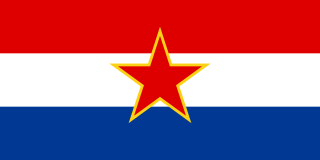
The Socialist Republic of Croatia, commonly abbreviated as SR Croatia and referred to as simply Croatia, was a constituent republic and federated state of the Socialist Federal Republic of Yugoslavia. By its constitution, modern-day Croatia is its direct continuation.
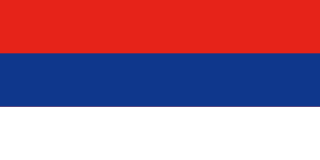
The Serbs of Croatia or Croatian Serbs constitute the largest national minority in Croatia. The community is predominantly Eastern Orthodox Christian by religion, as opposed to the Croats who are Catholic.

The Genocide of Serbs in the Independent State of Croatia was the systematic persecution and extermination of Serbs committed during World War II by the fascist Ustaše regime in the Nazi German puppet state known as the Independent State of Croatia between 1941 and 1945. It was carried out through executions in death camps, as well as through mass murder, ethnic cleansing, deportations, forced conversions, and war rape. This genocide was simultaneously carried out with the Holocaust in the NDH as well as the genocide of Roma, by combining Nazi racial policies with the ultimate goal of creating an ethnically pure Greater Croatia.

Anti-Serb sentiment or Serbophobia is a generally negative view of Serbs as an ethnic group. Historically it has been a basis for the persecution of ethnic Serbs.

An ala or hala is a female mythological creature recorded in the folklore of Bulgarians, Macedonians, and Serbs. Ale are considered demons of bad weather whose main purpose is to lead hail-producing thunderclouds in the direction of fields, vineyards, or orchards to destroy the crops, or loot and take them away. Extremely voracious, ale particularly like to eat children, though their gluttony is not limited to Earth. It is believed they sometimes try devouring the Sun or the Moon, causing eclipses, and that it would mean the end of the world should they succeed. When people encounter an ala, their mental or physical health, or even life, are in peril; however, her favor can be gained by approaching her with respect and trust. Being in a good relationship with an ala is very beneficial, because she makes her favorites rich and saves their lives in times of trouble.
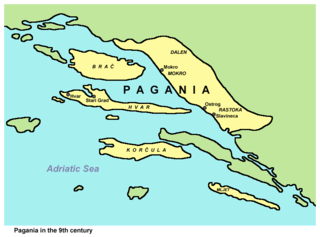
The Narentines were a South Slavic tribe that occupied an area of southern Dalmatia centered at the river Neretva, active in the 9th and 10th centuries, noted as pirates on the Adriatic. Named Narentani in Venetian sources, Greek sources call them Paganoi, "pagans", as they were for long pagan, in a time when neighbouring tribes were Christianized. The tribe were fierce enemies of the Republic of Venice, having attacked Venetian merchants and clergy passing on the Adriatic, and even raided close to Venice itself, as well as defeated the doge several times. Venetian–Narentine peace treaties did not last long, as the Narentines quickly returned to piracy. They were finally defeated in a Venetian crackdown at the turn of the 10th century and disappeared from sources by the 11th century.
Statuta Valachorum was a decree issued by Emperor Ferdinand II of the Habsburg monarchy on 5 October 1630 that defined the rights of "Vlachs" in the Military Frontier, in a way that it placed them under direct rule by Vienna, removing the jurisdiction of the Croatian parliament. This was one of three major laws enacted in the early 17th century on the taxation and tenancy rights of the Vlachs, together with the earlier 1608 decree by Emperor Rudolf II and a 1627 decree by Ferdinand.
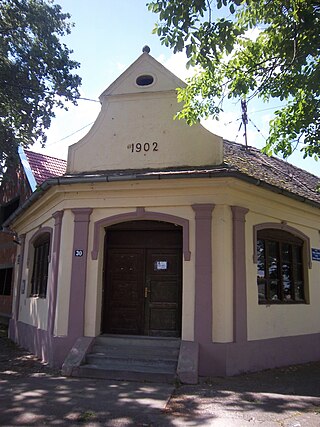
Ostrovo is a village in Croatia, municipality Markušica, Vukovar-Syrmia County.

Liberland, also known as the Free Republic of Liberland, is a micronation promoted by Czech right-libertarian politician and activist Vít Jedlička, who began claiming in 2015 that an uninhabited stretch of floodplain on the Croatian bank of the Danube, is the territory of a new independent country. Not recognized by any country, it has since become one of the best known examples of a micronation. Jedlička was inspired by classical liberal thinkers such as Ludwig von Mises and Ayn Rand, and he envisioned a political system characterised by laissez-faire capitalism, minimal government, and an economy based on cryptocurrency.
Kruščica was a concentration camp established and operated by the fascist, Croatian nationalist Ustaše movement near the town of Vitez, in the Independent State of Croatia (NDH), between August and October 1941, during World War II.

















